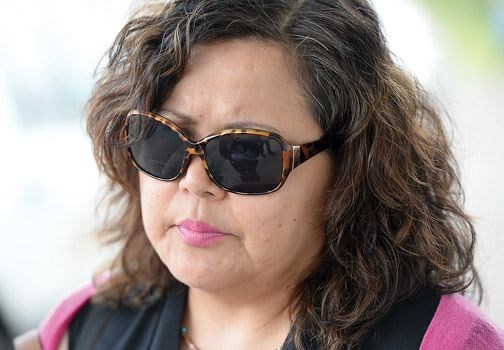BURNS LAKE — In the days leading up to the coroner's inquest into the Babine Forest Products explosion, Robert Luggi's widow relied on her family to calm her nerves and distract her tears.
"I don't know if our work ends here," said Maureen Luggi more than three years after the blast leveled the mill, killing her husband, 42-year-old Carl Charlie, and injuring 19 others.
"I firmly believe that our families have been treated unjustly," said Luggi, who was praised for her eloquent testimony Monday.
"I know we're tired. We're very weary and some days you really just want to give up and forget it, but as soon as we recover from that we end up feeling that something needs to be done."
That something, the families hoped, would be a public inquiry, but Luggi said she is well aware the limitations of the current inquest.
"I already understand that it will be recommendations that don't necessarily have to be followed up by anybody," said Luggi, who still sees value in her participation with the two-weeks of testimony.
"It is filling in the blanks. It is educating me and creating more awareness. It may give me more tools and information to take the fight further," said Luggi, who wanted further clarification about what went wrong in the WorksafeBC investigation that meant no criminal charges would laid for mill owner Hampton Affiliates.
In January 2014, WorkSafeBC said the Crown chose not to proceed with the four recommended administrative charges because of the inadmissibility of some of the evidence gathered by WorkSafeBC investigators and the defence of due diligence by Babine's owners.
If anything, the last three years have brought the Charlie and Luggi families together, she said, as well as the families affected by the April 2012 Lakeland Mills explosion that killed Glenn Roche and Allan Little.
"What we have accomplished so far I think has sent a very strong vibrations and messages out to government and they realize that they have some very fierce opponents that will question them," said Luggi, a former chief of the Wet'Suwet'en, near Smithers.
Charlie's sister Lucy Campbell said it was important the inquest was held in Burns Lake, giving the family a chance to honour his memory.
The month before her brother died, he was considering leaving the mill after 18 years.
"He just had enough," said Campbell.
He spoke of the poor conditions at the mill "all the time."
"He mentioned how tattered the electrical system, how bad the saw dust build up was," she said, and that the number of staff on the clean up crew had been reduced.
Like Luggi, Campbell understands the inquest won't lay blame, but she's still hoping for a good outcome.
To her, that means that the mill "acknowledge what they've done, letting these guys work in such horrible conditions."
Added sister Bernie Charlie, "There's been no accountability so far by Hampton Affiliates and by WorkSafeBC. Everything has been a disappointment.
"I don't know if it's worth it to relive the trauma," Charlie said of the inquest, noting the first day was also Carl Charlie son's birthday. "What will become of it? Will the recommendations that come out of it be enforced and by who and to what extent?"
It's that sentiment, said Lake Babine Nation Chief Wilf Adam, that will keep many affected by the blast away from the inquest.
"A lot of them are still looking for the closure they need," said Adam, who brought in counsellors for support. "A lot of them want to put it behind them and the feeling is that, you know, that nothing will happen, but my hope is when a worker leaves his house in the morning, they're expected to come home and work in a safe environment."
Adam said more than 60 people from the First Nation worked at the mill. Burns Lake Native Development Corporation, representing six local First Nations, owns an 11 per cent stake of the mill.
The closure of the mill affected the community beyond the tragedy. Charlie's sisters said the lost jobs transformed the community and meant many left.
"It really helped the community understand the importance of industry that we rely on and also it helps the community find ways to work with each other," Adam said.
For Luggi, that means a commitment to workplace safety and education that wasn't there before.
"It's really sad that we had to lose loved ones for other people to gain," she said.



